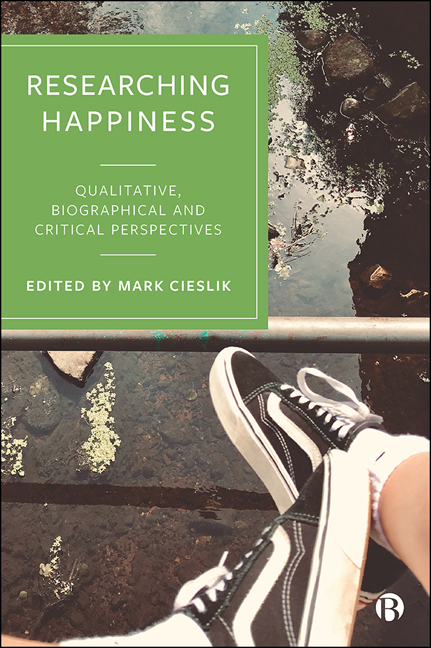Book contents
- Frontmatter
- Contents
- List of Figures and Tables
- Notes on Authors
- 1 Introduction: Developing Qualitative Research into Happiness and Wellbeing
- Part I Qualitative Research into Happiness/Wellbeing: Theories, Debates and Issues
- Part II Qualitative Research into Happiness/Wellbeing: Communities, Biographies and Identities
- Part III Qualitative Research into Happiness/Wellbeing: Methodological Innovations
- Index
9 - Using Social Wellbeing to Inform Regeneration Strategies in a Former Colliery Town in Northern England
Published online by Cambridge University Press: 22 December 2021
- Frontmatter
- Contents
- List of Figures and Tables
- Notes on Authors
- 1 Introduction: Developing Qualitative Research into Happiness and Wellbeing
- Part I Qualitative Research into Happiness/Wellbeing: Theories, Debates and Issues
- Part II Qualitative Research into Happiness/Wellbeing: Communities, Biographies and Identities
- Part III Qualitative Research into Happiness/Wellbeing: Methodological Innovations
- Index
Summary
Introduction
There is now an established argument that public policy should focus on conditions necessary for people's wellbeing as well as those for economic growth (McGregor, 2007; Bache and Reardon, 2013). In 2009, the Commission on the Measurement of Economic Performance (Stiglitz et al, 2009) published an influential report which argued that to achieve sustainable and inclusive development necessitates a clear shift from measuring societal progress in terms of production and consumption, to measures of human wellbeing. The last decade has seen an explosion of initiatives to conceptualize and measure human wellbeing and to put it into practice in academia and policy (OECD, 2011; Helliwell et al, 2017; Bache, 2018). The concept of wellbeing now appears at the heart of many UK public policies from the 2014 Care Act, to the current 25-year plan for the Environment (DEFRA). The UK Office of National Statistics created its National Wellbeing Programme, which aims to ‘produce accepted and trusted measures of the well-being of the nation’ and has incorporated subjective wellbeing questions into the Annual Population Survey since April 2011. This is viewed, by some, as a long-term process of transformative change, which could lead to a refocusing of government policy and agenda across many public policy sectors (Kroll, 2011).
To realize the full potential of wellbeing-orientated policy, beyond just the measurement of wellbeing, will require greater understanding about how wellbeing can be creatively employed in policy and practice, and the difference it can actually make to people's lives. Very often wellbeing is used narrowly as an output following an intervention or is used as an indicator of social change over time. It can also be used more ambitiously as an ‘input’ – a framing concept in the design phase of policy and practice. We can use it to understand the different wellbeing strategies people deploy, and the values which underpin these, illuminating new forms of social policy interventions. In their review of wellbeing and public policy in the UK, Bache et al (2016) distinguish two aspects to the wellbeing agenda: ‘measurement’ and ‘policy application’ arguing that while the former is well advanced, the latter remains ‘somewhat embryonic’, illustrating a clear gap in understanding how wellbeing influences research, policy and practice.
- Type
- Chapter
- Information
- Researching HappinessQualitative, Biographical and Critical Perspectives, pp. 175 - 196Publisher: Bristol University PressPrint publication year: 2021

